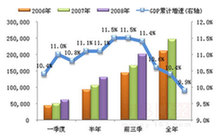国家统计局新闻发言人李晓超在国新办举行的发布会上介绍,前三季度国内生产总值同比增长9.9%。今年以来,中国GDP增速一直处于放缓状态,此前国家统计局发布的经济数据显示,一季度GDP同比增长10.6%,比上年同期回落1.1个百分点,上半年GDP同比增长10.4%,比上年同期回落1.8个百分点。第三季度GDP9%的增速直接导致前三季度GDP增长跌破10%。李晓超分析说,当前经济运行中的突出矛盾和问题主要是国际金融市场动荡多变,世界经济增速明显放缓,国际经济环境中的不确定不稳定因素明显增多,对我国经济的影响不断显现。
|

In the third quarter, the gross domestic product (GDP) growth rate slowed down to 9 percent, the lowest in five years, from 10.6 percent in the first quarter, 10.1 percent for the second quarter and 10.4 percent in the first half of 2008
|
|
|
China's economy, one of the fastest-growing economies in the world and the biggest contributor to global growth, grew 9.9 percent year-on-year in the first three quarters of this year, according to official figures released on Monday, showing a trend of a slowdown amid the current global financial crisis.
In the third quarter, the gross domestic product (GDP) growth rate slowed down to 9 percent, the lowest in five years, from 10.6 percent in the first quarter, 10.1 percent for the second quarter and 10.4 percent in the first half of 2008.
China's economic growth has been on a steady decline since peaking in the second quarter of 2007. The slowing world economy pummeled by the global financial crisis and weaker demand for Chinese exports on international markets heavily weighted on the Chinese economy, according to Li Xiaochao, spokesperson for the National Bureau of Statistics.
"However, the Chinese economy has maintained stable and relatively fast growth this year as the 9.9 percent growth rate in the first nine months was still higher than the annual average growth rate of 9.8 percent since China adopted the reform and opening policy in the late 1970s," Li said.
Another widely watched indicator, the consumer price index (CPI) -- an important measure of inflation -- rose 4.6 percent in September, over the same period last year.
The figure, coupled with 7.1 percent in June, 6.3 percent in July, 4.9 percent in August and a nearly 12-year-high of 8.7 percent in February, shows the CPI in a downward spiral.
Analysts mainly attribute the decline in the CPI to ample grain supply and lower-than-expected income growth of Chinese residents, as the housing and stock markets take heavy toll, which dented residents' desire to consume.
Chinese stocks have shed nearly 70 percent of their value from the last year's peak at 6,124 points due to weak investor confidence.
The stock market rose more than two percent on Monday amid expectation the government would unveil more measures to stimulate economy. The benchmark Shanghai Composite Index gained 43.36 points to close at 1,974.01 points.
Exports, one of the three major drivers of the Chinese economy along with investment and consumption, are taking hit from the global financial turmoil and economic slowdown. In the first three quarters exports grew 22.3 percent, 4.8 percent points lower than the same period last year.
Fixed assets investment totaled 11.6246 trillion yuan ($1.66 trillion) in the first three quarters of 2008, up 27.0 percent over the same period last year, according to the bureau.
The growth rate was 0.7 percentage points higher than the first half of this year, or 1.3 percentage points higher than the year-earlier level.
Another key economic indicator, retail sales, increased by 22 percent year-on-year in the first three quarters and climbed 23.2 percent in September alone. Analysts say China would have to further stimulate domestic consumption in order to push the economy forward amid an export slump.
"China still has huge potential and leeway to expand domestic consumption," Li said.
The combination of an economic slowdown and easing inflation may give rise to louder calls for loosening the monetary policy and adopting a more proactive fiscal policy.
Analysts expect more monetary easing, building on two cuts in interest rates and banks' required reserves since mid-September.
The State Council said on Sunday China's economy can weather the effects of the global financial turmoil, but growth will decline as business profits and public revenues slow.
In a statement at the end of an executive meeting presided by Premier Wen Jiabao, it said the global turmoil and economic instability will have a "gradual" effect on the country.
It said China's economic growth will slow along with corporate profits and public revenues, and as capital markets continue to fluctuate.
"Unfavorable international factors and the serious natural disasters at home have not changed the basic growth situation of our country's economy," said the statement posted on a government website. "Our country's economic growth has the ability and vigor to resist risks."
China must "adopt flexible and cautious macroeconomic policies" to maintain stable growth, the statement said.
The State Council said that in the fourth quarter, China should focus on developing the rural economy, while striving to control inflation.
(Chinadaily.com.cn)

(英语点津 Helen 编辑)